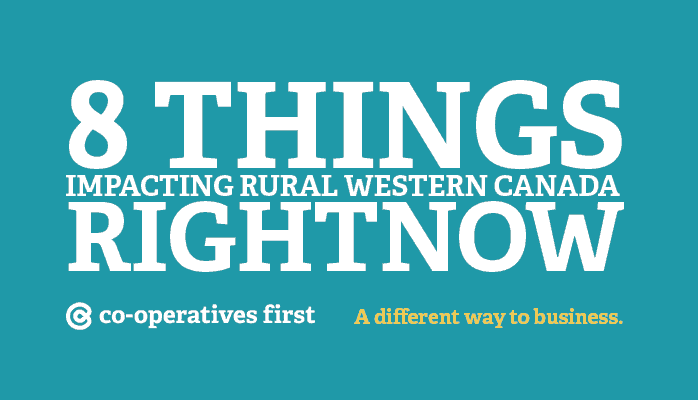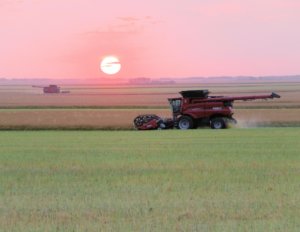While working in the Western part of rural Canada, our team encounters a variety of concerns shared by local leaders, business-owners and passionate community members. Through their stories, we’ve heard about the opportunities in these communities and the concerns of people living in them.
Here are 8 things having big impacts in rural Canada right now.
Changing nature of jobs
It will probably come as no surprise that technological advances are impacting employment stability, and both urban and rural Canada is being impacted. A large number of recent articles and studies indicate that many jobs in the coming years will be performed by machines and computers.
As automation becomes more prevalent, these changes could have a greater impact in rural Canada. The Economist suggests automation will impact the transportation, sales, administration, and natural resource industries. Alongside tourism, these industries are staples in rural economies.
Mass unemployment is probably a pessimistic view. In general, advances in technology has led to new job creation. But who gets what job and what this means for individuals, families and ways of doing things is uncertain.
Decline in numbers of youth
The total population in rural Canada has been declining since the 1850s. Within this trend is a decline in youth populations living in rural areas. Much of this can be attributed to young people leaving their home communities to access higher education, pursue a particular lifestyle and compete for better paying jobs.
An aging population puts in question the long-term sustainability of rural communities. As workforces decline, and there is increased uncertainty around business succession, local rural economies are struggling to save businesses and maintain functional local economies.
That said, some young people do maintain strong attachments to their home communities. Those that do often increase their involvement in community activities to ensure their families can access desired services. And communities with these people benefit.
Likewise, there are many western Canadian rural community leaders developing innovative ways to attract young families, create good paying jobs, keep businesses open and revitalize infrastructure and services in the community. Sangudo Opportunity Development Co-op is a great example of this kind of innovation and revitalization.
Lack of services for seniors
One of the pressing issues we’ve heard from communities, especially those in rural Manitoba and Saskatchewan, is services for seniors. As rural populations age, needs change and people require different levels of care.
Many rural communities lack sufficient housing or care facilities to meet this new demand. Not having the necessary services is forcing people to leave their community to access the level of care they need as they age.
Many communities have identified this issue and are creating innovative solutions. Arborg, MB and Mossbank, SK provide excellent examples of community leaders identifying a need, finding an opportunity and meeting the challenge head on.
Concerns over trade agreements
Trade is central to the Canadian economy. The natural resource and agriculture based economies in western Canada’s rural communities in particular rely on international trade deals to grow and provide stability.
In recent months, trade agreements have been making headlines. Whether a person is for or against the deals, the Trans-Pacific Partnership, Comprehensive Economic Trade Agreement, and North American Free Trade Agreement directly impact the lives of many rural Canadians.
Relying on producing export-ready natural resources (minerals, fish resources, lumber, grain and much more), rural Canada should benefit from the certainty created by free trade agreements. But changes in the geo-political landscape have threatened these agreements, which raises uncertainty for many producers and communities in rural areas.
Cross Community Partnerships
Connected to this is a growing recognition of the growth opportunity in cross community partnerships. First Nations have high birth rates, young and growing populations, and many of these Nation’s community and elected leaders are open to economic partnerships.
Municipalities and First Nations in rural and remote areas are exploring partnerships that will increase capacity and investor-readiness. Like municipalities, First Nations share challenges around transportation and access to markets. By working together, these partnerships can make increased infrastructure viable and investment more attractive.
Reliance on non-renewable energy
Last year, the federal government announced an impending Canada-wide carbon tax that must be implemented by provincial governments by 2018 or the feds will initiate it for them. The initial tax of $10 per tonne will increase to $50 per tonne by 2022, which will likely translate to an increase of 11.6 cents per liter of gasoline.
This coupled with increases in diesel, propane, and natural gas will lead to a significant increase in the cost of living and doing business for rural producers, especially those involved with the transportation and agriculture industries.
While a carbon tax may include additional provisions meant to offset increased costs to rural communities, there is no question this tax will impact communities that transport most of their goods long distances to and from major centres, use large machinery in almost every local wealth producing industry and have little choice but to drive for just about everything.
Changing nature of the Agriculture industry
Agriculture is an important element of western Canada’s economy, and provides a significant share of the jobs and wealth created each year. But the nature of the agriculture industry is changing rapidly thanks to technological advances in almost all areas of the industry. While much of the innovation happening in the prairie provinces builds on existing agriculture and agri-food businesses, it’s nonetheless having a large impact on how farming happens in the western provinces.
The number of farms is decreasing and the size of farms is increasing. Farms rarely stay in the family in the same way they have in the past. What is being grown and raised has changed quite dramatically. And each of these things has an impact on the communities and economies related to this pervasive industry.
Whether a person sees these changes as a bad or good thing is probably relative to how those individuals are personally impacted, but there is no question that it’s impacting rural communities and economies.
In response, we’re seeing interesting and innovative businesses being created to meet new opportunities. The adoption of renewable energy to offset rising non-renewable costs is one obvious growing and incentivized market. But, producers, like those around Westlock, AB, may find many incentives to collaborate using the co-operative business model to create efficiencies, cut costs, and add value to their products. Westlock Terminals, a New Generation Co-op, is a great example of farmers working together to use their assets to build a new business, increase the value of their products, retain vital infrastructure and create high-paying jobs.
Access to capital, continuity of service and succession planning
One of the greatest barriers to new business development is access to financial capital. This has implications in many rural communities as business owners approach retirement and try to find a buyer for their business.
Small rural communities need to retain these businesses. They are vital to the local economy, and the services and jobs they provide are key to maintaining a growing and thriving community. But supports for rural entrepreneurs may not provide the necessary capital to help finance the acquisition of a business – especially as banks continue to pull branches out of rural communities.
Loss of jobs and services coupled with an interest in seeing a return on financial capital motivated community leaders from the hamlet of Sangudo, AB to create an Opportunities Development Co-op.
Despite a rapidly changing world, the future is bright
Western Canada is full of spirited, entrepreneurial community leaders. While they may lose some sleep at night over these 7 things, these passionately pragmatic problem-solvers are dedicated to improving their community’s well-being through innovative solutions. And we’re honoured to have the opportunity to work alongside them.
If you have an opportunity you would like to explore, contact us. We’re here to help.

 Written by
Written by 




